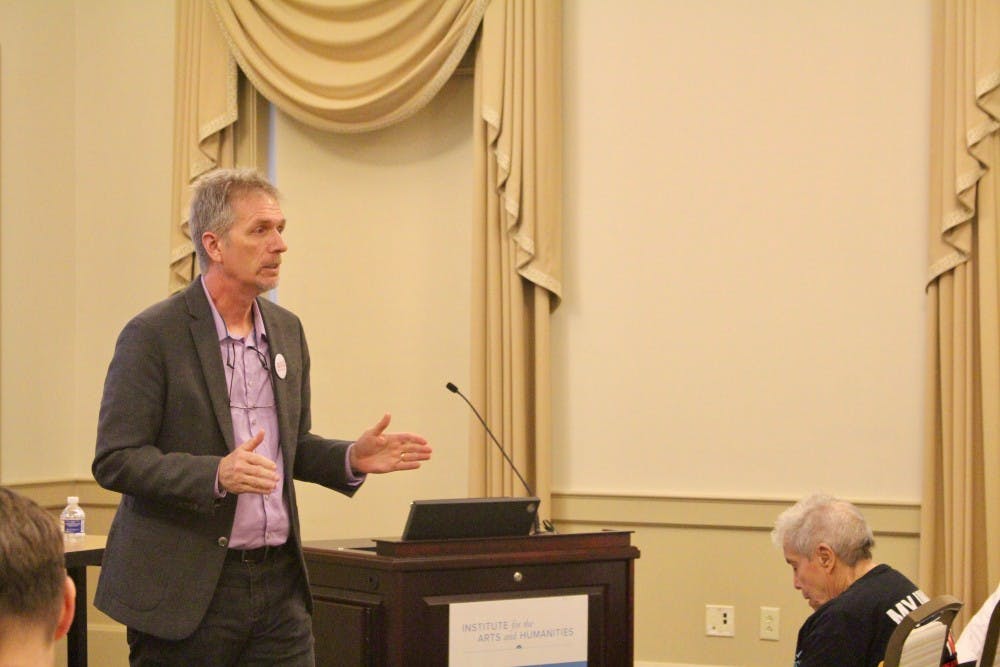“It seems to me that the Chancellor and the Provost are asking us to accept on faith that they've learned enough lessons, and they've done enough preparatory work, that we can allow them to roll the dice and see what happens,” Smith said. “And our position is, it is not worth the risk of rolling the dice, because the numbers are just too massive.”
In response to the op-ed, Vice Chancellor for Communications Joel Curran said in a statement that the University’s new testing policy is a key difference between the fall and the spring. Curran also pointed to plans for improved communication and enforcement of the University’s COVID-19 community standards.
"We are closely monitoring state and national case counts, and we are prepared to adjust our plans at any time and will announce changes no later than Jan. 9 – prior to the return of our on-campus residents, if the conditions necessitate it," Curran said in the statement.
Additionally, during a joint meeting between the UNC Faculty Council and Employee Forum on Dec. 4, Chancellor Kevin Guskiewicz and Provost Bob Blouin addressed some of the concerns highlighted by the op-ed.
“Infectious disease experts believe our asymptomatic testing program will identify cases and any trends earlier — as we were able to accomplish in mid-semester this fall with our pilot surveillance testing program — which would help stop the rapid spread of a virus into clusters,” Guskiewicz said.
But some professors, including Michael Palm of the communications department, feel that the University’s plans won’t be enough, given rising infections.
“I think there needs to be big, bold, brave decisions made in the face of political opposition to prioritizing health and safety of every member of the UNC community and every resident of the surrounding community of UNC campuses,” Palm said.
A "climate of suspicion"
Chairperson of the Faculty Mimi Chapman, who also sits on the CCAC, said although she can’t speak for the faculty as a whole, distrust stemming from incidents such as the NCAA scandal and Silent Sam has carried over into the present day, creating a climate of suspicion — though she believes that things may be improving.
“I do think, from a faculty governance perspective, that we’ve done an awful lot from the beginning of the pandemic forwards, to push for more and more information and openness and transparency,” Chapman said. “And I think we’ve gotten that.”
But Palm said he struggles to find something in the last year that has made him feel better about the University’s administration.
“If there aren’t some drastic improvements made soon, I think you’re going to see a real push among the faculty for a complete overhaul to not just faculty governance, but campus governance,” he said. “I think that crisis was there before the pandemic, but it’s been laid bare in literal life-and-death terms.”
To get the day's news and headlines in your inbox each morning, sign up for our email newsletters.
University's financial implications
One theme running through both the University’s reopening plans and faculty concerns is the University’s financial stability. During the Friday meeting, Guskiewicz said although UNC’s student enrollment increased in the fall, many other universities saw students taking gap semesters if there was no opportunity for an on-campus experience.
“Hopefully, our enrollments will stay level for the spring,” Guskiewicz said. “If they don’t, then there are financial implications with that.”
Smith said that although he understands that a remote spring semester could decrease student enrollment and ultimately hurt the University’s bottom line, he doesn’t think it’s worth risking lives.
“Implicit in that idea is that some faculty may be laid off or furloughed, or some programs could be shut down, and we, the faculty and the community, will face dire financial consequences,” he said. “Yes, we do have to pay the bills. Nevertheless, I think most of us who signed that letter consider it immoral to place financial considerations above health considerations in this ongoing emergency.”
Smith said he and other faculty members hope, with the arrival of the vaccine, the spring semester will be the last semester disrupted by COVID-19.
“That’s the silver lining around this cloud, but there is a cloud here,” he said. “Most faculty love teaching, love being in the classroom with our students. We love the day-to-day interaction, the dialogue, and we miss it too.”
But, Smith said, the sacrifices faculty, students and staff have made during the pandemic are essential to ensuring the health and well-being of the community.
“We have, if not an unprecedented, at least a once-in-a-century public health emergency here,” he said. "And it’s incumbent upon all of us connected to the University — students and faculty and staff — all of us, to be patient for a few more months, swallow hard, and accept the reality that we just can’t have a normal semester in the spring.”
@seaynthia
university@dailytarheel.com



